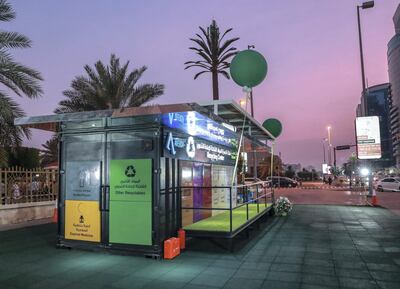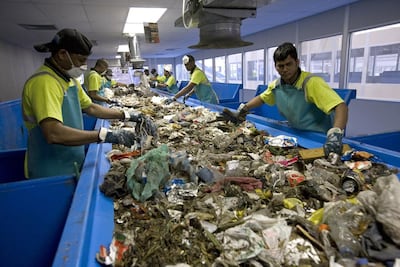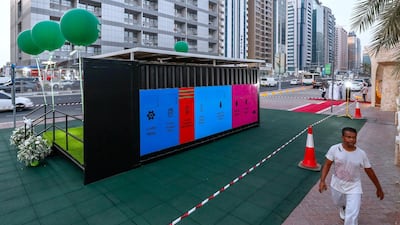Separating recyclables will be a simple step towards encouraging more efficient recycling habits among residents and drive the UAE towards becoming more environmentally conscious.
New recycling stations are being installed across Abu Dhabi and are expected to cut the emirate’s waste disposal costs.
The first of the 16 stations planned for Abu Dhabi city was installed at the entrance of Khalidiyah Public Park two months ago as a trial and allows for the recycling of almost all household items.
The station moves beyond the simple segregation of paper, cans and bottles to include wood, cardboard, mobile phones, used batteries, plastic, wool, metal and cotton. Clear and coloured glass also each have their own compartments.
It was officially launched by the Minister of Climate Change and Environment, Dr Thani Al Zeyoudi, on Tuesday after the trial proved successful among residents in the neighbourhood.
Sunil Thawani, 60, an Indian living in Khalidiyah, has made it a habit to walk from his home to the station twice a week over the past two months.
“I come every Friday and a day in between to drop the waste in. At home I separate the plastic from the metal from the paper, then I bring those three bags here,” he said.
“Best part about this is it has many options: cartons, cans, clear glass, bottles … generally you only find three options but they have done very good thinking to segregate.”

He would previously have to take his recycling to his office but said that having a comprehensive segregated station should only be the beginning.
“To make it successful, people need to organise themselves at home otherwise they won’t do it here (at the station).”
Mr Thawani has been segregating his waste for five years and said the new stations were the first “serious effort” he had seen from the municipality to encourage recycling.
“Earlier they just had separate bins and when the (garbage) truck comes it puts everything in one can,” he said of an incident he witnessed three years ago.
His only suggestion was to make the bins bigger, particularly those for plastic waste since the bins at the new station have been overflowing on Fridays.
“This is a very small bin. On Friday it overflows because of the big pile of litter, water bottles consume a lot of volume,” he said.
The idea for the new station was born out of the municipality’s desire to create “waste management mines” across the emirate, said Dr Salem Al Kaabi, the acting general manager of Tadweer.
By year end, the Municipality plans to have installed 16 comprehensive recycling stations in the city and 10 others in Al Ain.
They will also be installed across the outskirts of the emirate and in Al Dhafra by the end of 2019.
“These mines or stations will not only help the environment but also increase people’s awareness on separating rubbish. And that will reflect on the economic value of the recycled substances,” Dr Al Kaabi said.
When recyclables are thrown in regular waste, they must be manually separated by workers at waste disposal centres to be recycled, decreasing efficiency and increasing costs for recycling plants.
“But if you dispose it here (in the special plastic waste can) it will immediately go to the recycling factory,” Dr Al Kaabi said.
______________
Read more:
Recycling in UAE: 'I don't want my bright green straw wedged in some turtle's nose'
Capital plan to reuse 75% of waste by 2021
Residents still need more information to effectively recycle in the UAE
UAE recycling: Residents and government must share responsibility
______________
Last year, Tadweer announced plans to recycle more than 60 per cent of waste by 2020 and 75 per cent by 2021. It said it would build eight recycling plants in the emirate to meet that goal.
At the time, Tadweer was recycling more than 30 per cent of 797,466 tonnes of waste generated every month.
Materials collected from the recycling bins are taken to a sorting facility in Al Ain, where they end up in different batches.
The plastic waste goes to the processing site, where it is turned into materials ready for production, while the metal, paper and glass waste are sold to the market as sorted material for other companies to recycle. Abu Dhabi has recycling plants for plastic products, used tyres, construction and demolition waste, and used engine oil.
But even with the most stringent of recycling plans, the second a resident throws a non-recyclable item in a “green bin” the entire process becomes futile.
Ordinary rubbish contaminates recyclables and lowers the value of the entire processing — adding costs to both the disposal process and the environment.
It is intended that the clearly demarcated new stations will reduce the chance of this happening.

Dr Al Kaabi said three tonnes of waste were collected from the Khalidiyah recycling station in a single month, without it being publicised, indicating that “residents want this”.
The site for the first station was chosen to be near a popular public place and residential buildings to give more people access – as will be the criteria for the remaining stations planned.
Campaigns to teach pupils about waste segregation and recycling have been under way at schools for five years, said Fatima Al Harmoodi, senior public awareness officer at Tadweer.
“And we have been distributing brochures about recycling starting with kindergarten for a year now.”
Tadweer asked all schools to provide recycling bins for pupils to teach them how to use them.
“Just as all children know McDonald’s and Pizza Hut, they must know how to recycle,” Ms Al Harmoodi said.
While 70 per cent of Tadweer’s awareness programmes are directed at children, adults have also been receiving their share of education.
“We visit government departments to educate employees at their offices, and other organisations once they hear about us they call and ask us to go to them,” Ms Al Harmoodi said.
But she said: “If you want to make amendments in a society, start with the children, don’t go to adults. This [recycling culture] is new for our societies so it must be rooted in the children’s subconscious.”
The pupils have also been proactive, she said. One Indian boy volunteered with Tadweer to distribute surveys at Lulu Hypermarket.
“He sat with them and delivered our message and because of him they opened a counter especially for customers using recyclable bags.”


